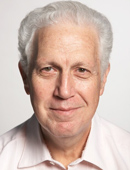Biography
Research Topics
Apoptosis/Cell Death, Cytokines, Enzymology, Glutathione, Heme Proteins, Liver, Macrophage, Mitochondria, Oxidative Stress, Protein Degradation
Apoptosis/Cell Death, Cytokines, Enzymology, Glutathione, Heme Proteins, Liver, Macrophage, Mitochondria, Oxidative Stress, Protein Degradation
Multi-Disciplinary Training Area
Disease Mechanisms and Therapeutics (DMT)
Disease Mechanisms and Therapeutics (DMT)
